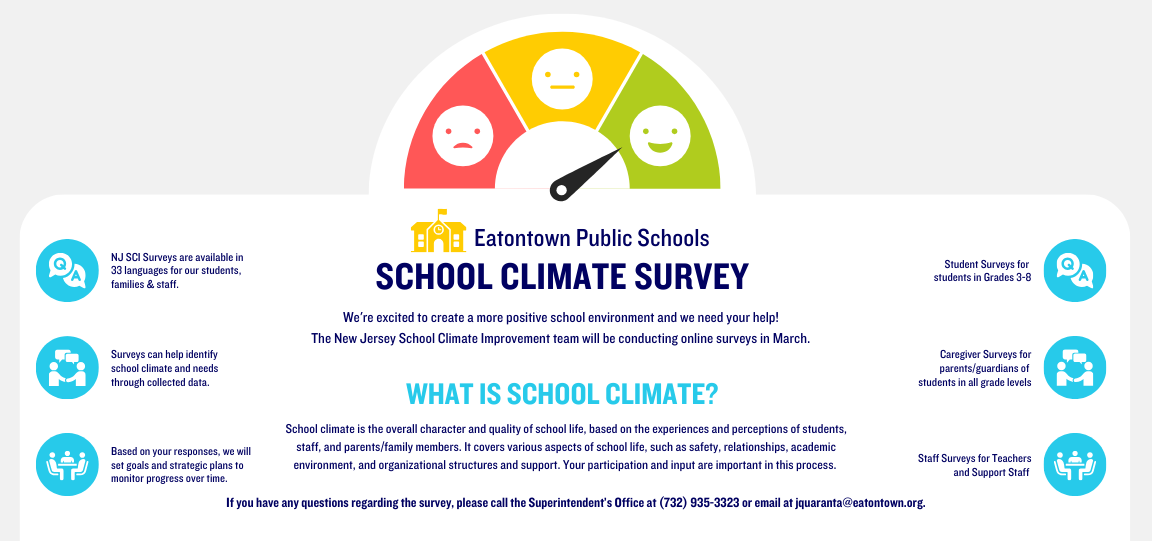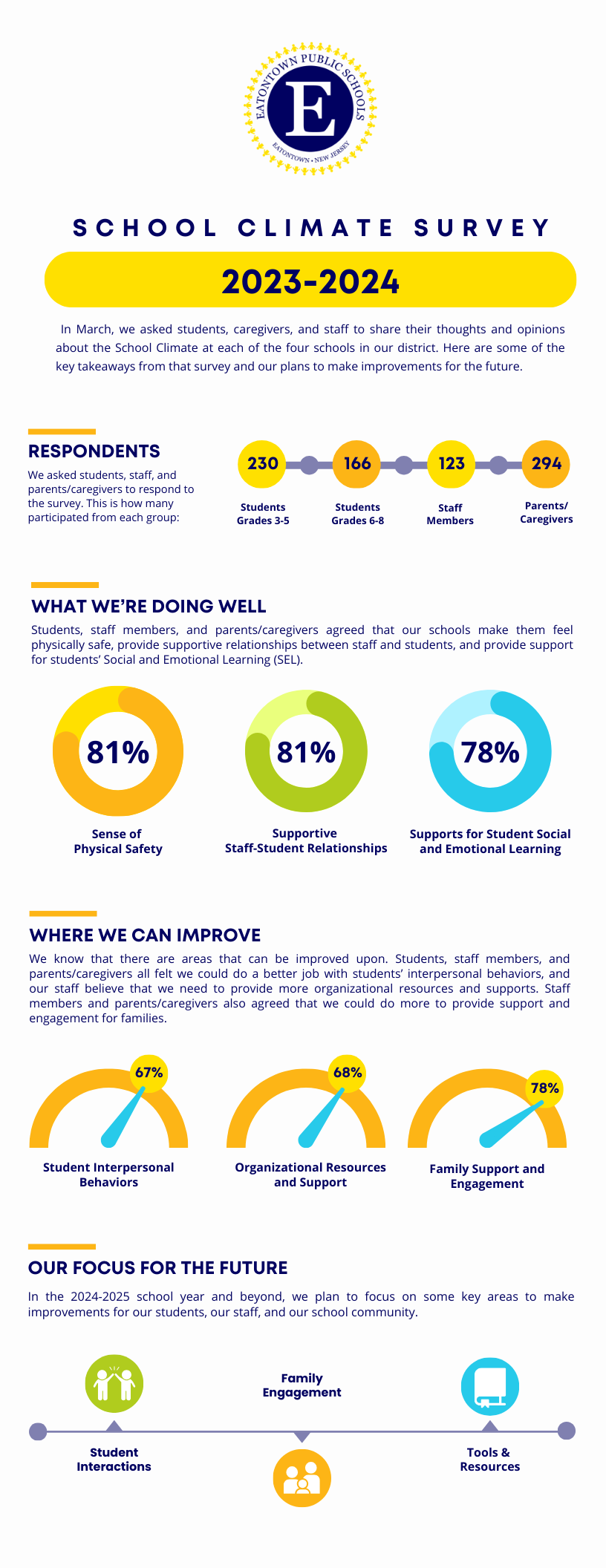
What is School Climate?
School climate refers to the current character and quality of school life (National School Climate Council, 2007). It is based on the interconnected experiences, perceptions, and impressions of students, staff, and parents/family members. It encompasses multiple dimensions of school life including safety, relationships, academic environment, and organizational structures and supports. (Espelage, Low, & Jimerson, 2014; Marraccini, Fang, Levine, Chin, & Pittleman, 2019; National School Climate Council, 2007; Rudasill, Snyder, Levinson, & Adelson, 2017; Wang & Degol, 2015)
Why is a positive School Climate important for students?
Improved academic achievement and performance
Increased attendance and graduation rates
Prevention of bullying and violence
School safety as well as student physical, psychological, social and emotional health and
well being
Positive intergroup relations (e.g., student-student; student-staff) and inclusion practices
(Bohanon, Flannery, Malloy & Fenning, 2009; Brand, Felner, Seitsinger, Burns & Bolton, 2007; Cohen, McCabe, Michelli & Pickeral, 2009; Hosford & O’Sullivan, 2016; Kutsyuruba, Klinger, & Hussain, 2015; Thapa, Cohen, Guffy, & Higgins-D’Alessandro, 2013)
Why is a positive School Climate important for staff?
Feelings of physical and emotional safety
Increased confidence they staff can positively impact student learning
Increased involvement in decision-making and collaboration
Minimized emotional exhaustion, depersonalization, feelings of low personal accomplishment
Increased commitment to the profession (retention/reduced turnover) as teachers feel
supported by school leaders and colleagues
Use of engaged teaching styles
(Kutsyuruba, Klinger, & Hussain, 2015; Thapa, Cohen, Guffy, & Higgins-D’Alessandro, 2013)
Why is a positive School Climate important for parents/families?
Increased levels of satisfactions with the school
Greater involvement in children’s education
Greater influence on children’s attitudes and motivation for academic achievement
Increased parental and family involvement in the school community
Improved relationships and communication between staff and parents
(Bear, Yang, & Pasipanodya, 2015; Eccles, 2007; Green, Walker, Hoover-Dempsey, and Sandler, 2007; Hoover-Dempsey et al., 2005)
Why is a positive School Climate important for everyone?
School climate reform supports bullying and violence prevention, and reduced aggression has been linked to higher achievement scores.
Strengthening student-student and student-staff relationships is associated with higher student self-esteem and achievement.
Building positive race relations is associated with student achievement.
School climate is associated with reduced risky behaviors via students’ feelings of connectedness.
Positive school climate promotes students’ abilities to learn, to engage in cooperative learning, and to experience group cohesion, respect, and mutual trust.
CLICK HERE to access a research article summarizing the above outcomes.
Parents' and Caregivers' Quick Guide to School Climate
What is School Climate?
School climate is how it feels to be a part of the school community from an individual member’s point of view. Students, staff, and families of students all experience the climate of the school. School climate can also be thought of as the “conditions for learning.” If you think about school climate like the weather, you want a clear, mild, sunny day to allow activities to be done safely and comfortably and without distractions. Similarly, there are conditions for learning (e.g., feeling safe, feeling connected, feeling engaged) that help set the stage for effective teaching and learning in schools. Climate represents the overall conditions over a long period of time, and changing the climate can take time and deliberate interventions.
How do schools know what their climate is like?
Every child deserves to go to a school with a safe, supportive, and inclusive climate. To gather everyone’s perceptions on school climate, schools can use an established school climate survey. When a school decides to use a climate survey to measure school climate, they are recognizing that school climate is important to supporting learning, and they are valuing the perspective of all members of the community in their efforts to make climate better. School climate surveys are like a “temperature check” to understand how participants are feeling at a given time. They can help a school understand areas of strength and areas of concern. The data can be used to set goals to improve the climate over time. Leaders in the school can share the results of the climate survey with the community and work together to select research-based strategies to improve in areas that need improvement. After implementing those strategies over time, the school can administer the same survey again to see if things are improving.
The New Jersey School Climate Improvement (NJ SCI) Survey is a new survey that was developed by the School Climate Transformation Project at Rutgers University with the New Jersey Department of Education (NJDOE). It is free for public PK-12 schools to use, and school staff get access to an online Platform which helps them collect the data, view data reports, and make decisions about how to improve school climate.
How can I talk to my child about school climate?
Sometimes getting kids to talk about their experiences in school can be challenging, especially as they get older. It is important to keep the lines of communication open at all times (not only during the survey or when challenges occur), to listen to your child’s perspectives and experiences, to validate their feelings about school, and to make checking in a regular practice (e.g., sharing the day’s highs and lows at dinner or bedtime; using a journal to pass reflections back and forth with your child). The NJ SCI Survey can be a good entry point for talking about your child’s experience in school. The survey asks about different aspects of school climate, from how students get along with one another, to their feelings about schoolwork and opportunities to get involved in activities. For younger students, you can invite them to talk with you about how they feel about school in general. For older kids, you can let them know that you are taking the survey seriously and want to make sure you understand how they feel before you give your answers. See an example of what to say below, along with some sample age-appropriate questions to get the conversation going.
“I’m going to take the NJ SCI Survey soon because as your (e.g., parent, grandparent), I want to make sure you have everything you need to do well in school. Sharing my opinions will help your school understand the ways that they are doing well, and the ways that they could be doing better. It could help make things better for you in school. First, I want to talk to you so I can better understand how you feel about school. That will help me to answer the questions on my survey. You will also be asked to take a survey while you are in school so you can share your opinions directly.”
Questions for all students:
What is your favorite thing about your school?
What makes you look forward to going to school?
Tell me about a day in your classroom/classes.
How do kids in your school get along with one another? Tell me about some examples (both kind behaviors and negative behaviors)
If you could change anything about your school, what would you change?
Is there anything else you want me to know about your school?
What can I do to help you do your best at school?
Questions for Students in Grades PK-Grade 2:
Tell me about your teacher(s).
Tell me about the rules in your school.
Tell me about the things you learn in your classroom.
Questions for students in Grades 6-8:
Tell me about how your teachers make you feel in their classes.
How do you know how your teachers expect you to behave?
Tell me about the work you do in your classes and the topics you cover.
Tell me about activities you can do in school outside of the classroom.
How does your school help make you feel safe?
Do you feel like you can be yourself at school?
You can encourage your child to elaborate or provide examples by responding to their answers on any question with “tell me more about that.” You know your child best and can skip questions or reword them to be appropriate and easily understood by your child. End the conversation by expressing gratitude to your child for sharing their thoughts with you. Validate their feelings and opinions (e.g., repeat back main points, acknowledge how they are feeling is real) and provide an expression of care. Let them know they can talk to you about their experience in school anytime, and that you will participate in the survey, which will help the school know how students feel overall. Assure them that the surveys are anonymous, so the school will not know how anyone responded on either the student or parent/caregiver surveys.
Thank you for supporting school climate measurement and improvement in your school. Please visit www.njschoolclimate.org for more information about the NJ SCI Survey and Platform.
2023-2024 School Climate Survey Results
In March of 2024, we asked students, caregivers, and staff to share their thoughts and opinions about the School Climate at each of the four schools in our district. Here are some of the key takeaways from that survey and our plans to make improvements for the future.
Respondents
We asked students, staff, and parents/caregivers to respond to the survey. This is how many participated from each group:
230 students in Grades 3-5
166 students in Grades 6-8
123 staff members
294 parents/caregivers
What we're doing well
Students, staff members, and parents/caregivers agrees that our schools make them feel physically safe, provide supportive relationships between staff and students, and provide support for students' Social and Emotional Learning (SEL).
81% rated the district high in the category Sense of Physical Safety
81% of respondents rated the district high for Supportive Staff-Student Relationships
78% rated the district high for Supports for Student Social and Emotional Learning
Where we can improve
We know that there are areas that can be improved upon. Students, staff members, and parents/caregivers all felt we could do a better job with students' interpersonal behaviors, and our staff believe that we need to provide more organizational resources and supports. Staff members and parents/caregivers also agreed that we could do more to provide support and engagement for families.
67% of respondents rated the district low for Student Interpersonal Behaviors
68% of staff respondents rated the district low for Organizational Resources and Supports
78% of staff members and parents/caregivers combined rated the district low for Family Support and Engagement.
Our focus for the future
In the 2024-2025 school year and beyond, we plan to focus on some key areas to make improvements for our students, our staff, and our school community. We will focus on Student Interactions, Family Engagement, and Tools & Resources.

